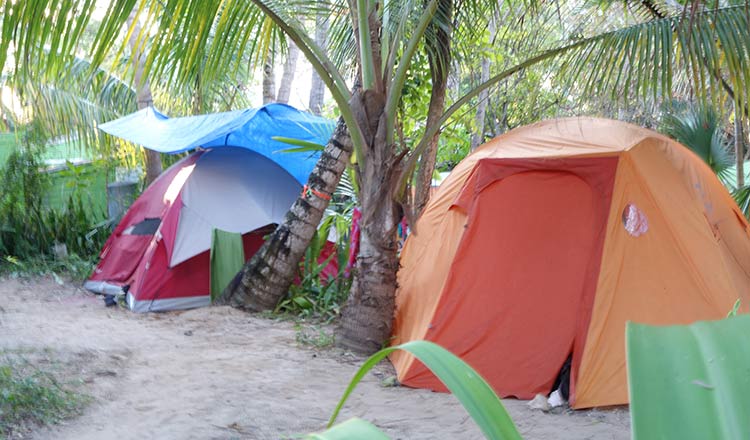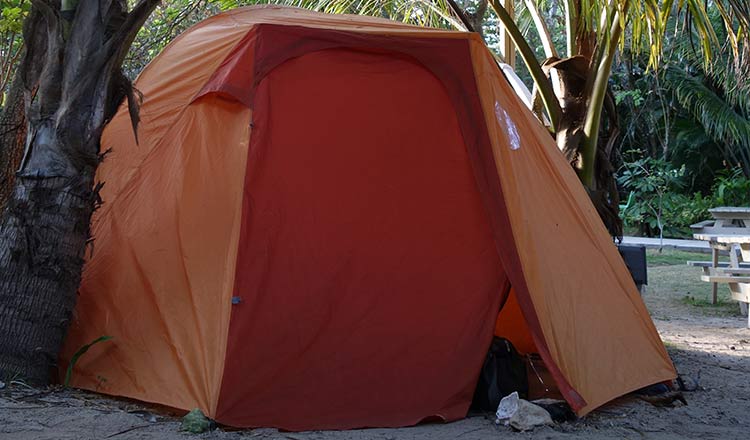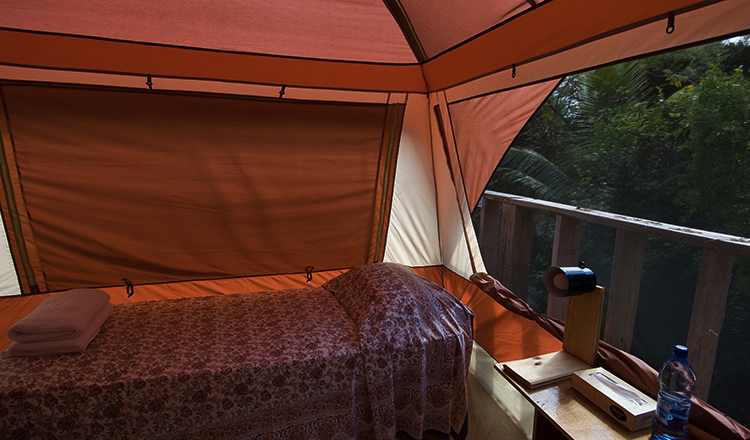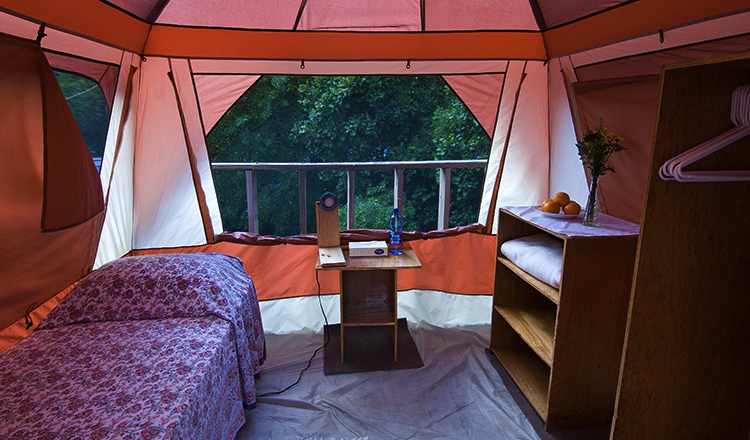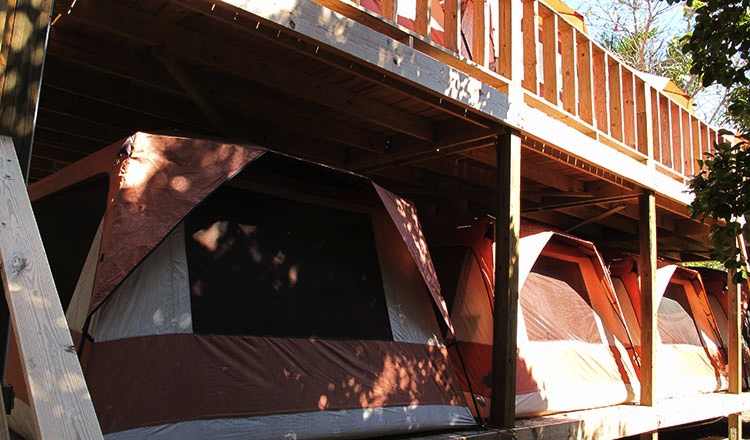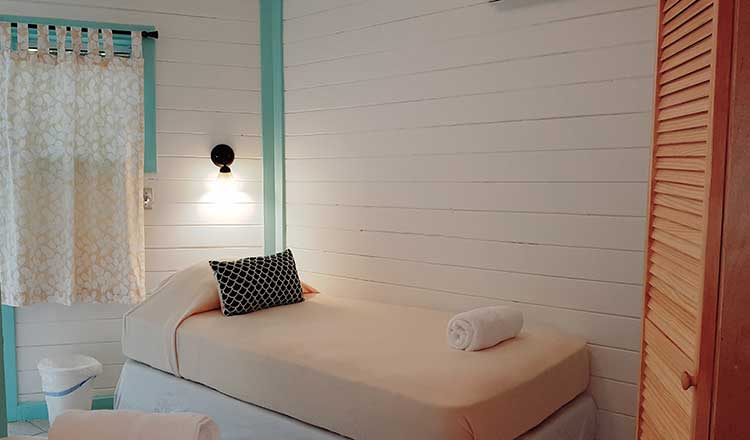Accommodations
The cost of ATTC/TTC is based on your housing choice.
Tent Space
| Tent Space | November – May | June | July |
| $2,400 | Not available | Not available |
Tent Hut Single
| Tent Hut Single | November – May | June | July |
| $3,300 | $2,400* | Not available |
Single Room
| Single Room | November – May | June | July |
| $5,300 | $5,300 | $5,300 |
Tent Hut Double (private)
| Tent Hut Double (private) | November – May | June | July |
| $3,600 | $3,600 | Not available |
Payment Information
A $300 deposit is required when you register in order to guarantee your place. The balance is due at least 14 days before your arrival. We will send you an email reminder a week before we process the balance.
For other housing options (at standard rates) and for any other questions
- Please email [email protected]
- Or call the TTC advisor:
US and Canada: 1-866-559-5167;
All other countries: 1-416-479-0199. Choose ext. 129.
***
Please note:
- Rates are in US dollars.
- A Bahamian VAT tax of 10% is NOT included and will be added.
- Prices include tuition, accommodation, two daily meals, two pairs of yoga pants and two T-shirts, the course manual, and all classes.
Discounts
- Bahamian citizens receive 10% off the cost of the TTC.
- Students registering simultaneously for the Yoga Teacher Training Course and the Advanced Yoga Teacher Training Course (500-hour Yoga Alliance Certification) will receive a 10% discount on the total fee for both courses.
Plan Your Trip
Arrival & Departure
Please plan to arrive at least the day before the ATTC start day and depart the day after the ATTC end date.. The cost for the ATTC includes these two nights. Please see the Getting Here for detailed information on traveling to the Yoga Retreat.
When possible, it is recommended that you spend a few days in the Yoga Vacation Program before the start of the ATTC and/or when you graduate, to assimilate what you’ve learned. Many graduates stay on for a month or more in the Karma Yoga Residential Study Program, which is highly recommended as a way to fully immerse in ashram life and practice teaching yoga to others.
Health
Certain physical conditions might limit your ability or prevent you from taking the Advanced Yoga Teacher Training Course. Please contact us prior to registering if you are pregnant, suffering from recent head, neck, or back injury, are taking medication prescribed by a psychiatrist, or have any other condition that might limit your ability to practice yoga postures or otherwise participate in an intensive training.
Dress Code
Since its inception under Swami Vishudevananda, participants in the ATTC wear white pants and a yellow top. This uniform not only creates a unity among all the trainees and ease (not having to decide what to wear), it holds meaning: the yellow represents the seeking of true knowledge and the white represents purification of the self.
We are proud of our ATTC trainees and your presence at the ashram makes a visual statement to all guests about your commitment to yoga and yoga studies.
Upon arrival, you will receive two pairs of white yoga pants and two yellow t-shirts to wear throughout the training. You are expected to wear the ATTC uniform at all times (including at satsangs), with the following exceptions:
- during asana practice: wear your own clothes during the ATTC-specific asana classes. Your own practice clothes should still be modest (ie. no halter tops, low necklines, or short shorts)
- at the beach (although you should plan to bring a cover-up to wear on your way to the beach)
- days off: around the ashram, you are welcome to dress in casual, comfortable clothes suitable for warm days and cool evenings. Your clothing should cover your shoulders and knees; you will be most comfortable in light-weight pants (women can also wear long skirts or dresses)
- while off-site (on Paradise Island and in Nassau), you still represent the ashram and should plan to dress accordingly
What to Bring
Your arrival pack will include a list of optional recommended books; these will be available on-site at the boutique.
Notebook and pens
Wrist-watch with second hand (for teaching); not a smart phone
Yoga mat
Meditation cushion (optional)
Meditation shawl (for satsangs)
Slip-on sandals
Swimsuit
Beach towel
Sunscreen
Rain gear
Toiletries, including soap
Alarm clock
Flashlight
Insect repellent
Travel mug or tumbler
Water bottle
Dry snack foods (nuts, energy bars)
Snorkeling equipment (optional)
For tent space only: bring your own tent, bedding, and towels.
Please note that there are laundry facilities onsite. Tokens for the washer and dryer, as well as laundry soap, are available for purchase at the Boutique (Reception during the summer).
Testimonials
From our graduates:
The ATTC enhanced my spiritual development, self and collective understanding, and commitment to develop karma yoga projects. Overall, I have a more genuine sense of what it means to be a yogi.
—April 2015 graduate
The ATTC is a solid program. The Sivananda ashram has an abundance of top teachers, an incredibly array of programming, and a beautiful and pure lineage.
—Earle B.
In addition to the course material which provided an expanded awareness for meditation, every satsang enhanced the learning with presentations from renowned scientists, musicians, and healers alike. I am forever grateful to Swami Sivananda and Swami Visnudevananda for sharing the path and creating the opportunity. I am closer to Peace, closer to Self and burning with desire to share.
—Elizabeth J.
It was challenging. The discipline was good to help reset daily habits that do not serve me. All my teachers were inspiring and full of love.
—Chelsea K.
By far the most comprehensive, complete, and authentic Yoga Teacher Training program I have ever seen. The full immersion in yogic lifestyle was very rewarding!
—Mukunda
ATTC was an amazing experience! Great group, great teachers, great time! The location is beautiful! This place is where I go when I need peace, silence, and yoga. Highly recommended.
—Parvati
The dedication of all of the teachers to maintaining a consistent message reflecting Swami Sivananda’s teachings is very inspiring. The retreat is a place of love where you feel safe to challenge yourself and explore your limits with the support of knowledgeable, caring people.
—Rukmini (Pat Russell)
A truly transformational experience both spiritually and mentally. I was overwhelmed by the ashram experience in the beginning, however, I have grown to love the community, the spirit, the energy, and the people.
—Kamala Devi
The teachers and my classmates are amazing, knowledgable, friendly, and open-hearted. It was pleasant just to be in their company.
—Eric
The Sanskrit & Vedanta classes were inspirational, as were Iswara’s asana classes — a real blessing. Thank you!
—Victoria Clifford
Curriculum
Hatha Yoga: find new angles to your practice with advanced variations and prolonged holding of the asanas (postures); learn to better manage your energy flow with advanced pranayama (breathing), mudras (energy seals) and bandhas (energy locks).
Jnana Yoga (the Yoga of Wisdom): expand your knowledge and get inspired to take your Self study (Swadhyaya) to the next level with the study of Vedanta philosophy including study of Jnana Yoga theory and Vedantic meditation techniques.
Sanskrit: learn the Sanskrit alphabet and correct pronunciation and spelling of mantras and hymns.
Raja Yoga: dive deeper into your mind through an in-depth study of Patanjali’s Yoga Sutras.
Bhakti Yoga: open your heart to true love through studies of the nine modes of Bhakti and the five attitudes of devotion (Bhavas).
Karma Yoga: explore Karma Yoga as an inner attitude of selfless service.
Certification & Credits
At the end of each ATTC, students take an exam. Upon successful completion of the course students receive the Certificate of the International Sivananda Yoga Vedanta Centers, entitled Yoga Acharya (Master of Yoga).
This training is registered by and fulfills the requirements for the Yoga Alliance 500-hour certification, for which graduates of the program are invited to register.
Daily Schedule
4:30 am: Wake up
5:00 am: Pranayama
6:00 am: Satsang (meditation, chanting, lecture)
8:00 am: Asana Practice
9:00 am: Anatomy & Physiology
10:00 am: Brunch
11:00 am: Karma Yoga
12:00 pm: Study of Raja Yoga or Sanskrit
2:00 pm: Main Lecture on Vedanta
4:00 pm: Asanas & Pranayama
6:00 pm: Dinner
8:00 pm: Satsang (meditation, chanting, lecture)
- ATTC students have the option to respectfully leave satsang at 9:30pm.
10:00 pm: Lights Out
Students enjoy special programs, festivals, concerts and symposiums that are offered during evening satsangs (for a list of programs see our Calendar of Events.
There is one weekly day off. During the day off students are only required to attend morning and evening satsangs and to perform their Karma Yoga. During their free time, students are welcome to enjoy the services of the Well-Being Center or the daily workshops offered at the ashram; students can also explore the ashram’s vicinity or take the time to rest on the beach or in the garden.
* Attendance at all activities is mandatory. Changes in the program may occur from time to time.
The best yoga teachers are the ones who practice deeply themselves. Ready to take your personal practice to the next level? Learn about others who did the same and received their Masters of Yoga certification.
When you immerse yourself, the practice becomes part of you. Dive into ATTC and invite yoga into the deeper parts of yourself. Watch and get inspired.



